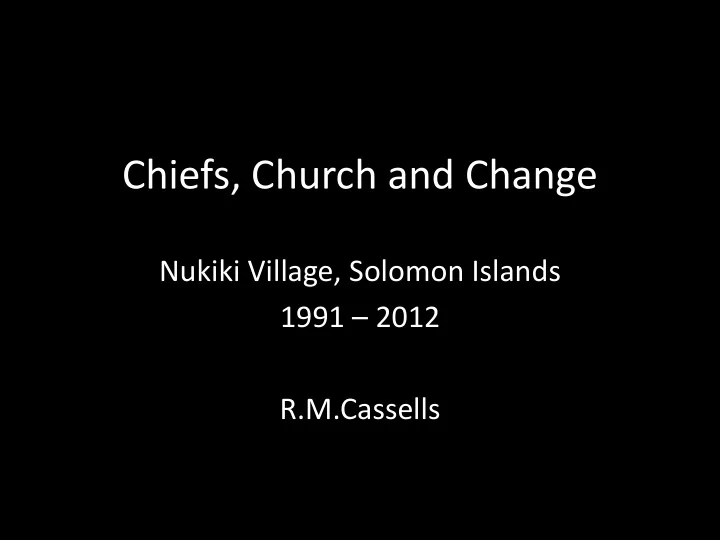

Chiefs, Church and Change Nukiki Village, Solomon Islands 1991 – 2012 R.M.Cassells
Topics • Custom, governance and Westminster • Nukiki 1991 – Nukiki 2012 • Chiefs and church • Governance and change
Custom, governance and Westminster • 2002 – 2008 VSA Solomon Islands programme • Capacity building – provincial governments • Skilled volunteers – legal advisers, accountants, business managers, etc • Work alongside local staff
• Became clear, Westminster parliamentary system not well understood • Nor did it sit comfortably with customary forms of governance • Was adversarial, emphasis on individual • Rather than on collective identity – tends to characterise kin group societies
• Examine - whether another form of governance could function – one more aligned to Solomon Islands way of doing things • Possibly hybrid political orders – situations where customary and western forms of governance merge • Examine village governance - and relationship with provincial government • Location - Nukiki village, Choiseul Province (there 1991)
Nukiki 1991
• Medium sized subsistence village - 408 people • Spread over 10 small hamlets • Scattered along coast - between coconut groves and dense forest
Gardens
• Forest provided main livelihood – subsistence (explain) • Primary school • But few children made it to secondary school • Prospects for any employment outside village – limited • Logging was occurring nearby – but villagers against it then
Nukiki 2012
• By 2012 Nukiki – changed • Choiseul - became separate province late 1991 • Administration based on Taro Island - 8km from Nukiki
Taro – provincial headquarters
• Increasingly urban provincial centre - having significant effect on Nukiki • It provided work for villagers, some of whom commuted daily • Cash economy was becoming more important • With easy access to services – villagers becoming less self-reliant • A level of dependency was developing
Family size
• Population - more than doubled – 910 people • The 10 hamlets coalesced into 5 main settlements • Permanent houses had begun to outnumber leaf houses
Permanent house
• Density of housing - greater • Corrugated iron roofs, water tanks, solar lighting, generators, electric lights, dvd players and cell phones were now common • Subsistence gardening still provided most household food • Suitable garden land - now in short supply • Due to increasing population
Logging - Mbirambira
• Logging - now underway • Provided significant input of cash • Some used for infrastructure – school buildings, teachers’ houses, clinic • Balance divided up amongst all villagers • Logging was creating tension in village • Allegations - inequitable distribution of logging royalties by Chief and Trustees
Talaevondo Stream 1991
• Sea-level rise - also a major concern • Streams had provided freshwater in 1991 • By 2012 - saline, jeopardising freshwater supplies
Village governance - chiefs and church • Three main tribes of 1991 still remained • Each tribe had its own chief • Patrilineal - chiefly status inherited, but custom sufficiently flexible • Chief responsible – land + welfare of tribe
Chief - Siropodoko tribe
• Within each tribe were various clans – family, descent or kin groups • Each have own leader - or chief
Chief – Sarekana clan
• Some maintained - crisis of leadership in Choiseul • Respect for chief - declining • Intermarriage between tribes and outsiders - diluting tribal loyalties and allegiance to chiefs • Older chiefs often uneducated – less respect for his decisions (if bad) • Inequitable distribution of logging royalties – loss of respect
Pastor - Nukiki United Church
• Church - increasingly dominant role in village governance • Especially in large, multiple tribe villages – e.g. Nukiki • Village governance strong – works well • But - largely church-focussed • Church well respected, but not well-equipped to deal with changes occurring • Nor its primary function
Governance summarised • Village governance • Examples of political hybridity do exist • Main form – between chiefs (custom) and church • Both complement each other
• At provincial level – hybridity also exists in application of law • Both western and customary law applied • Boundary between two - matter of discretion, and personal preference • Here forms of complementarity, substitution, and even incompatibility exist
• Villagers - see provincial government as service provider • Not very interested in policies • Provincial ward member – main link between provincial government and village • Strength of link depends on provincial member
• If new Federal Constitution adopted • Scope for forms of political hybridity at provincial level may increase • Lauru Land Conference of Tribal Communities – considerable work on tribal genealogies, tribal land boundaries, codifying custom • Useful - formation of Choiseul State constitution
• Customary practices – oral - inherent flexibility • Tend to resist written codification • Basis for traditional authority different - personal rather than institutional • Based on knowledge, skill, reputation
• If formalise status of chiefs - create new kind of chief • Not respected – not ‘real’ chief - appointed - like government official • Legislating custom may diminish its authority • Make subsidiary to western law
• Hard to predict what will happen • Choiseul leaders - unified in their support for the new Federal Constitution • My guess is a new political order will evolve if Choiseul becomes a state • And custom will have a greater place in local politics
• But whatever form – will be very much shaped by Christianity • It is this discourse between Christianity and custom that underpins Choiseul society today
Recommend
More recommend